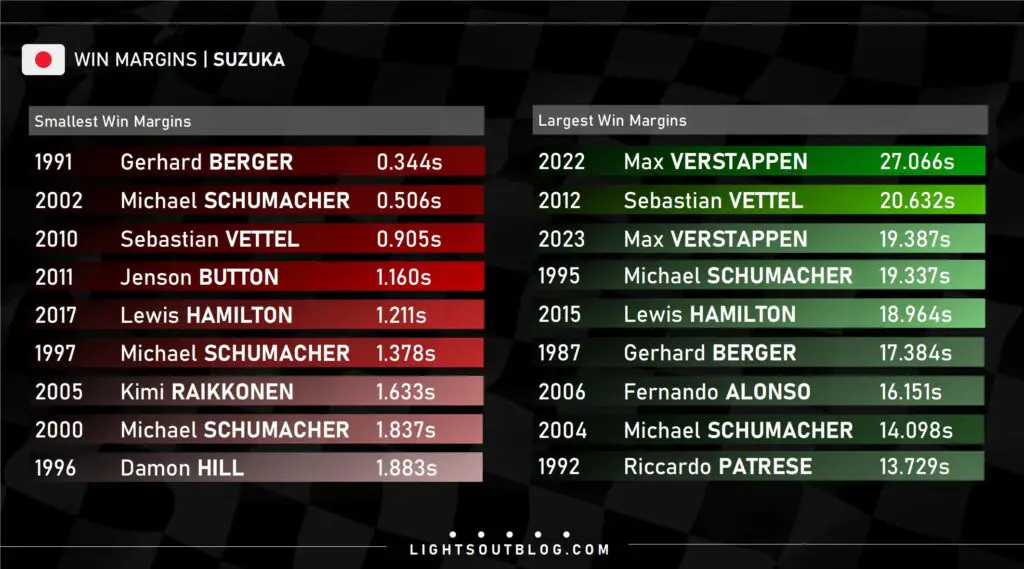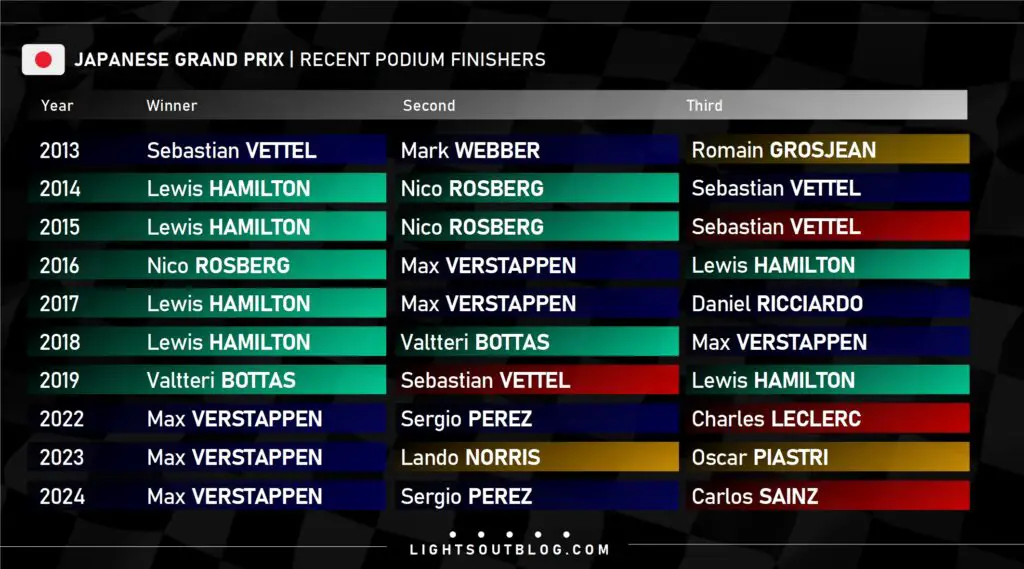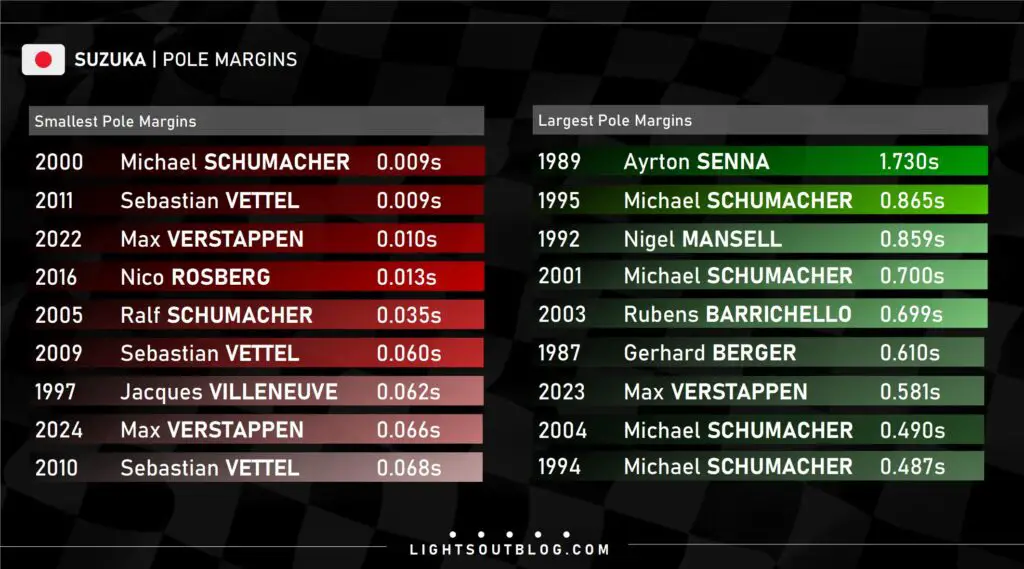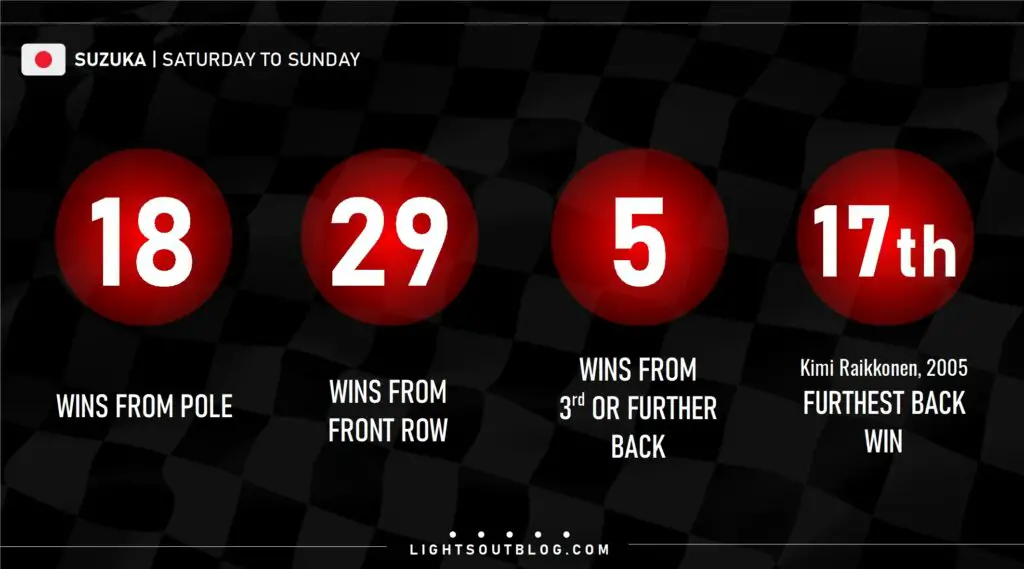
Suzuka is one of two circuits which has hosted the Japanese Grand Prix. It first joined the calendar in 1987. Here are all the facts and statistics you need to know about Suzuka ahead of the Japanese Grand Prix!
Track length: 5.807km
Race length: 307.471km
Laps: 53
Turns: 18
Circuit opened: 1962
F1 first visited: 1987
Races held: 34
Track Record: 1:27.064, Sebastian Vettel, 2019
Lap Record: 1:30.983, Lewis Hamilton, 2019
RACE WINNERS AT SUZUKA
There have been 33 F1 races held at Suzuka since 1987. Aside from Suzuka, Fuji Speedway also hosted the Japanese Grand Prix in 1976, 1977, 2007 and 2008. The Japanese Grand Prix was not held in 2020 or 2021 due to the coronavirus pandemic.
Since 1987, 17 different drivers have won the Japanese Grand Prix at Suzuka.
Michael Schumacher has the most Suzuka wins
Michael Schumacher has taken the most victories at the track, having won here six times.
There are three previous winners of the Japanese Grand Prix on the 2025 grid. Lewis Hamilton has the most wins of the current field at Suzuka, with four, while Max Verstappen has won the last three Suzuka races. Fernando Alonso has a single victory at the track.
Mika Hakkinen, Michael Schumacher, Sebastian Vettel, Lewis Hamilton and Max Verstappen are the five drivers who’ve taken back-to-back victories at the Suzuka track. Michael Schumacher and Max Verstappen are the only driver to have taken more than two consecutive victories here, Schumacher won three times in a row in 2000, 2001 and 2002, while Verstappen has won the last three races at teh track.
German drivers have 11 victories at Suzuka, more than any other nation.
The longest streak of different winners at the Japanese Grand Prix came between 1989 and 1995, when there were no repeat winners for seven seasons.
Just one driver has recorded a Grand Slam at Suzuka
Sebastian Vettel is the only driver to record a Grand Slam at Suzuka. He took pole, led every lap and set the fastest lap on his way to winning the 2012 Japanese Grand Prix.
Three teams are tied for most wins at Suzuka
Ferrari, McLaren and Red Bull are tied as the teams with the most victories here, with seven apiece.
Mercedes is the most successful engine manufacturer at the circuit, with their engines winning here ten times.
McLaren, Benetton, Ferrari, Red Bull and Mercedes are the five teams who have recorded 1-2 finishes at Suzuka. Red Bull are the most recent team to do so, in 2024.
Red Bull have the record for most 1-2 finishes at Suzuka, with four – one more than Mercedes.
Benetton, McLaren, Ferrari, Red Bull and Mercedes have all taken back-to-back wins at Suzuka. Red Bull’s 2022 victory ended a streak of six consecutive Japanese Grand Prix wins for Mercedes – the longest ever winning streak for a team at the track.
Verstappen holds the record for biggest Suzuka win margin
Max Verstappen set a new record for the largest winning margin at Suzuka in 2022, taking victory in the rain-shortened race by 27.066 seconds.
Gerhard Berger’s win at the 1991 Japanese Grand Prix is the smallest win margin at Suzuka, as the Austrian finished 0.344 seconds ahead of team-mate Ayrton Senna.

The Japanese Grand Prix at Suzuka has been won by less than five seconds on 13 occasions, and has been won by less than ten seconds 18 times. It has been won by less than a second three times – in 1991, 2002 and 2010.
The average win margin at Suzuka is 9.282 seconds. From the past ten Japanese Grands Prix at Suzuka, the average win margin has been 12.671 seconds.
ON THE PODIUM
From the 34 times that the Japanese Grand Prix has been held at Suzuka, 42 different drivers have finished on the podium.
Schumacher has the most podiums at Suzuka
The driver with the most Suzuka podium finishes is Michael Schumacher, who finished in the top three here nine times.

There are seven drivers on the current grid who have previously finished on the Suzuka podium. Lewis Hamilton has finished in the top three seven times, Max Verstappen has six podium appearances here, Fernando Alonso has appeared on the podium four times, while Charles Leclerc, Lando Norris, Oscar Piastri and Carlos Sainz each have a single top three finish here.
Lando Norris’ podium at the 2023 Japanese Grand Prix saw Britain overtake Germany as the nation with the most podiums at Suzuka, recording the nation’s 22nd podium finish at the track.
McLaren have the most podiums at the track
McLaren have had the most podium appearances of any team at the track, extending the record to 24 with a double podium result in the 2023 Japanese Grand Prix.
The polesitter has finished on the podium in 27 of the 34 Suzuka races
The polesitter at Suzuka has gone on to finish on the podium in every race at the track since 2006, and in 27 of the 34 races held at the track in total.
There have been just two races at Suzuka where none of the top three qualifiers went on to finish on the podium. It happened in 1989 and 1990.
There have been six occasions where the top three on the grid at Suzuka all finished on the podium, including three times in the past seven races.
2000, 2009 and 2018 are the only occasions on which the top three finished in the order in which they started at Suzuka.
LEARN MORE ABOUT SUZUKA
JAPANESE GRAND PRIX POLESITTERS
14 different drivers have started from pole at the Suzuka circuit.
Schumacher has the most poles at Suzuka
Michael Schumacher has more pole positions than any other driver here, with eight.
Lewis Hamilton and Max Verstappen are the only drivers on the current grid to have previously started from pole at this track. While Hamilton has two poles here, Verstappen has taken Japanese Grand Prix pole position in the last two seasons.
Ayrton Senna, Jacques Villeneuve, Michael Schumacher, Sebastian Vettel, Nico Rosberg, Lewis Hamilton and Max Verstappen are the seven drivers who have taken back-to-back poles at Suzuka.
Michael Schumacher holds the record for the most consecutive pole positions at the track, having set the fastest qualifying time in every season between 1998 and 2002.
German drivers have taken more poles than any other nation, with 17 pole positions shared between Michael Schumacher, Sebastian Vettel, Nico Rosberg and Ralf Schumacher.
The 1998 Japanese Grand Prix – in which Michael Schumacher stalled on the grid – is the only Suzuka race at which the fastest qualifier has not started from pole position.
Ferrari have the most Suzuka poles of any team
Ferrari have taken the most poles of any team, with ten starts from the front of the grid.
The record for most consecutive team poles at Suzuka belongs to Ferrari, who set the pace in every season between 1998 and 2004.
There have been 16 occasions on which a team has locked-out the front row at Suzuka. 2024 was the first time it had happened since 2019.
Mercedes and Red Bull share the record for most front row lock-outs at the track, with four apiece.
Only Senna has taken pole by over a second at Suzuka
There has been just one occasion where pole has been taken by more than one second here. That was in 1989, when Ayrton Senna took pole by 1.730 seconds.

The smallest pole margin here is 0.009 seconds, which has happened twice – for Michael Schumacher in 2000 and Sebastian Vettel in 2011.
Pole has been decided by less than a tenth of a second at Suzuka ten times, most recently in 2024.
The average pole margin at Suzuka is 0.332 seconds. From the last ten Japanese Grands Prix at Suzuka, the average pole margin has been 0.194 seconds.
SATURDAY TO SUNDAY
Just over half of the 34 Japanese Grands Prix held at Suzuka have been won from pole position, while 30 have been won from the front row of the grid.
Just four races here have been won from further back than third on the grid: in 1989, 1990, 2005 and 2006.

The furthest back win here came in 2005, when Kimi Raikkonen took victory from 17th on the grid. It also marks the furthest back podium finish at the circuit.
There have been nine occasions on which the polesitter has finished on the podium at Suzuka without winning the race.
There have been 12 Suzuka races in which the polesitter has not led at the end of the first lap. Ayrton Senna is the only polesitter to retire on the opening lap at Suzuka, doing so in the 1990 Japanese Grand Prix – a race in which he famously collided with title rival Alain Prost at Turn 1.
From the past 22 Suzuka races, the 2015 Japanese Grand Prix is the only time that the polesitter has completed the first lap of the race outside of the top two positions. Nico Rosberg was fourth at the end of Lap 1 that year.
SUNDAY STATISTICS
There have been 1,757 racing laps of the Suzuka Circuit since F1 first visited in 1987.
Michael Schumacher is the driver to have raced the most laps at Suzuka, having raced 862 laps at the track. He is the only driver to have raced more than 800 laps at the track.
791 cars have entered into Grands Prix held at Suzuka. Of those, 759 have qualified for races, while 752 have started the race. From the 752 cars which have started a race at Suzuka, 523 have reached the chequered flag. That gives an overall finish rate of just under 70%.
Schumacher has the most fastest laps at Suzuka
Michael Schumacher has taken more fastest laps than any other driver at Suzuka. He set the Sunday pace on four occasions.
Williams are the team with the most fastest laps at the track, with their drivers setting the fastest race lap on eight occasions.
Schumacher has led the most laps in Japan
Michael Schumacher holds the record for most laps led at Suzuka, having spent 309 laps in the lad at the track. He’s the only driver to have led more than 200 laps at the circuit.
In total, 34 drivers have led at least one lap at the track. 15 drivers have led laps here without winning a race. Alain Prost holds the record for most laps led at the track without taking a victory. He led 76 laps in total here during his career.
There have been seven occasions which the winner of the Japanese Grand Prix at Suzuka has led every lap of the race. It first happened in 1996 and last happened in 2018.
There have been nine occasions on which the winner of a Suzuka race was not the driver who led the most laps in the Grand Prix.
The fewest laps led en-route to victory at Suzuka is two, which is how many laps Alessandro Nannini led in the 1989 Japanese Grand Prix. Ayrton Senna originally crossed the line first in this race, but was later disqualified. Kimi Raikkonen is the only other driver to lead less than ten laps on his way to victory at Suzuka, doing so by leading six laps in 2005.
The record for most different leaders in a single race at Suzuka is six, which is how many drivers led a lap during the 2005 Japanese Grand Prix.
Red Flags and Safety Cars at Suzuka
There have been 12 races at Suzuka which have featured a Safety Car. The most Safety Car appearances in one race here is three, which occurred in 2014.
Seven Japanese Grands Prix at Suzuka have been affected by rain.
Four Suzuka races have been red-flagged. This happened in 1994, 2014 – when the Grand Prix was red-flagged twice – 2022 and 2024. While the first three in the list were red-flagged due to wet weather conditions, the 2024 Japanese Grand Prix was red-flagged due to a first lap crash.
The first three red flagged races, and the 2019 race, failed to reach their scheduled distance. The chequered flag was shown one lap early in 2019.
CHAMPIONSHIP GLORY
A World Champion has been crowned at Suzuka 12 times, including in five consecutive years between 1987 and 1991. The most recent World Champion to be crowned here was Max Verstappen in 2022.
The Constructors’ Championship has been decided at Suzuka on nine occasions, most recently in 2023 when Red Bull won the title for the sixth time.
2024 was the first time in Suzuka’s history on the F1 calendar that the team leading the Constructors’ Championship after the Japanese Grand Prix at the track failed to go on to win that year’s title.
The winner of the Japanese Grand Prix at Suzuka has gone on to win the title in the same season on 21 occasions, including in all but one of the past 11 seasons in which the Japanese Grand Prix has been held. The exception was Valtteri Bottas, in 2019.
The polesitter at the Suzuka race has won the title in the same year 20 times.
From the 34 races held at Suzuka, there have been just three where the leader of the championship after the race has failed to go on to win the World Championship. Michael Schumacher led after the Japanese Grand Prix in 1997, but failed to seal the title, while Mark Webber and Fernando Alonso suffered a similar fate in 2010 and 2012 respectively.
There have been five dead rubber races held at Suzuka. Both titles had already been decided before F1 visited Suzuka in 1992, 1993, 2001, 2002 and 2004.




